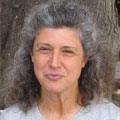 High Density Grid
High Density Grid
During each of the cruises for this long-term set of observations, we have spent most of one day conducting a detailed investigation of the marine… {Read More »}

 Maria Vernet is a marine scientist from Scripps Institution of Oceanography at the University of California, San Diego. She has participated in various studies involving phytoplankton ecology and physiology including the effects of ultraviolet radiation on photosynthesis to the grazing by Antarctic krill on coastal phytoplankton. During
Maria Vernet is a marine scientist from Scripps Institution of Oceanography at the University of California, San Diego. She has participated in various studies involving phytoplankton ecology and physiology including the effects of ultraviolet radiation on photosynthesis to the grazing by Antarctic krill on coastal phytoplankton. During 







